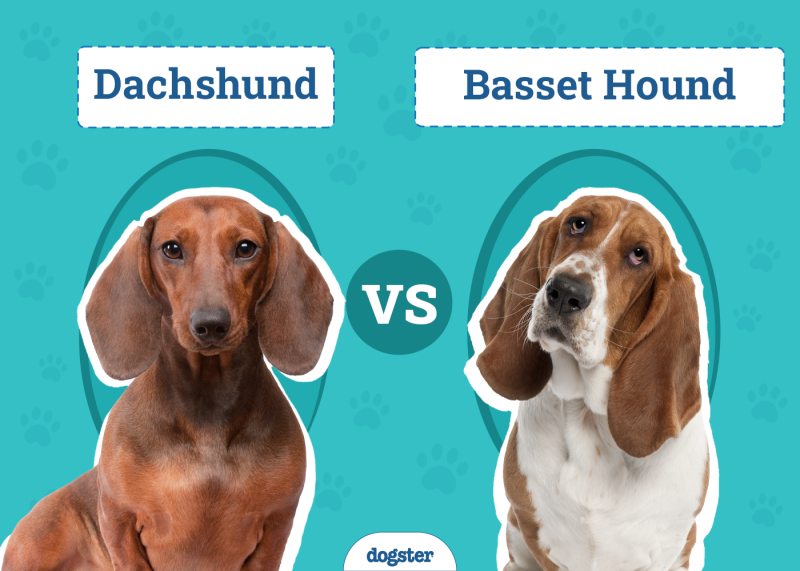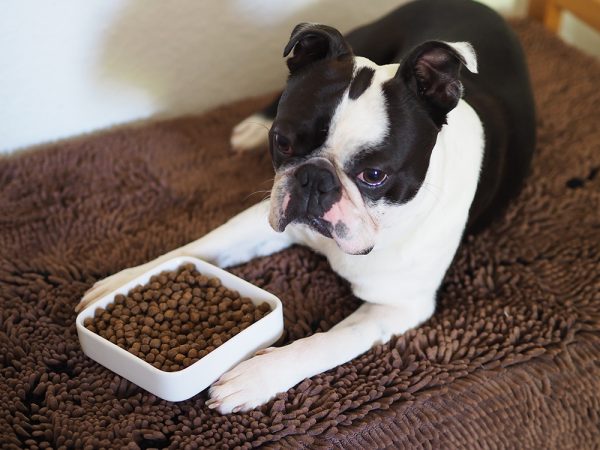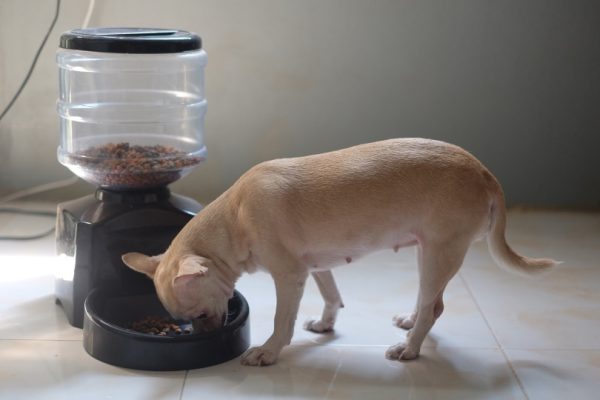Ahhh, spring! Flowers and trees are blooming, grass is growing, bees are buzzing, and allergies are in full force for many people, and in some cases, even their dogs! Yes, it’s true; man’s best friend can have allergies that can vary from season to season just like their human counterparts.
But how do allergies present in dogs, what is the cause, and how can you care for your beloved canine companion if this is the case? We’ll discuss all these things and more as we explore seasonal allergies in dogs below.

What Are Seasonal Allergies?
Before we talk about seasonal allergies specifically, let’s address what allergies in general look like for our canine friends. An allergy is when the body overreacts to specific substances, called allergens, that are foreign to the body. This allergen, which is a protein, can be inhaled, ingested, or absorbed into the skin, which then releases histamine, brings about a chain reaction, and leads to an allergic response attack that can result in itching and inflammation.
There are three primary groupings of allergies in dogs: food, flea, and environmental. In dogs, environmental allergies are referred to by the veterinary medical world as atopic dermatitis or atopy. These environmental allergies include indoor and outdoor substances in the world around them, such as grass, weed, or tree pollen as well as dust mites, dander, mold, etc.
Seasonal allergies include a subset of environmental allergies and in some cases, flea allergies, that change and cycle from time to time, most often associated with a certain period of the year. The individual seasons (spring, summer, and fall are the most common) can have particular activities that accompany that period of time. However, it’s also important to keep in mind that depending on the climate, such as with tropical ones, “seasonal” may be a more relative term as plants, their pollen, and fleas may be present for much of the year.
Traditionally, in dogs, some types of seasonal allergies could include pollen from plants (such as grass, weeds, or trees), as well as flea allergies (termed flea allergy dermatitis).
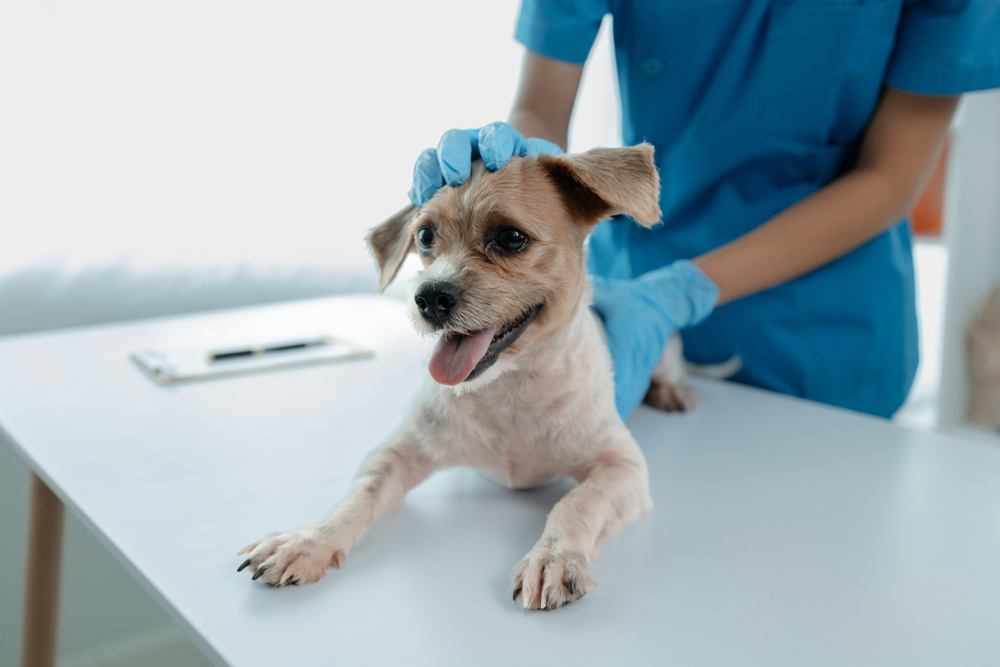
What Are the Signs of Seasonal Allergies?
While many people with seasonal allergies may present with itchy eyes and sneezing, dogs actually most commonly present with changes to the skin. In addition, they can vary from dog to dog, but common signs that can be associated with allergies include:
- Itchy skin (pruritus) is the number one sign for those affected, which may result in the affected dog licking, chewing, rubbing, or scratching.
- Rhinitis (nasal swelling that often consists of nasal congestion, eye or nose discharge, and sneezing) and asthma can occur in a smaller number of dogs.
- If fleas are at play, black specks of flea fecal material called “flea dirt” may be present.
Signs often secondary to self-trauma from itching:
-
- Pimple-like bumps
- Inflammation of the skin
- Hair loss
- Redness
- Scaling skin
- Salivary staining from repetitive licking
- Crusts, excoriations
- Skin discoloration
- Superficial bacterial and/or yeast infections
- Ear infections (in some animals, this may be the only observable problem)
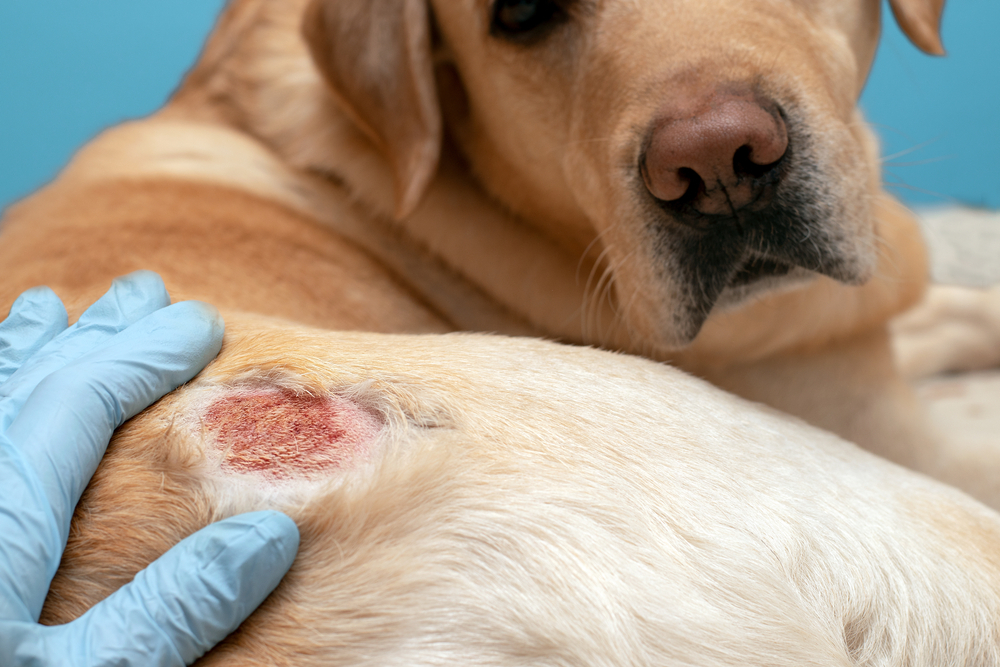
Where do these signs most commonly occur?
- Feet
- Face
- Ears
- Top surface of the legs
- Abdomen (underside of belly)
What Are the Causes of Seasonal Allergies?
As mentioned, plant pollen (a small, powdered substance from plants that is released into the environment to allow for plant reproduction) and fleas (a type of small wingless insect that feeds on animal blood) are common causes of seasonal allergies. These allergens cause a hypersensitive reaction and may be inhaled or absorbed on the skin from the environment.
There are many factors to be considered when evaluating seasonal allergies in your dog. In some, it’s thought to have a genetic component that can be inherited, and it can vary from area to area based on dog geographic gene pools. In addition, while any dog may develop seasonal allergies, certain breeds are more predisposed, which can include Golden and Labrador Retrievers, Boxers, Shih Tzu, Lhasa Apso, Boston Terriers, and Dalmatians to name a few.
Keep in mind that the other piece to the seasonal allergy puzzle is local environmental factors. For example, not only must a dog be predisposed or have genetic contributions regarding seasonal allergies, but they also need to live in an area where that specific allergen is present!
For example, if a dog is allergic to a specific tree pollen but does not live in a place where that tree is present, they won’t have that specific allergy problem.
A vet will be able to advise you on the best course of action to ensure the well-being of your pet.
If you need to speak with a vet but can't get to one, head over to PangoVet. It's our online service where you can talk to a vet online and get the advice you need for your dog — all at an affordable price!

How Do I Care for a Dog with Seasonal Allergies?
At the veterinary clinic
For seasonal allergies, a thorough history of the affected dog will be very important, including when signs were first noted and where, if they began being present only at certain times of the year, etc. A physical exam will then provide your doctor with important clues about what the next steps are. They may find it important to rule out other causes such as food allergy or various types of external parasites such as mites.
In addition, they will check and identify any potential (and in many cases, probable) secondary bacterial and/or fungal infections. In some cases, at a certain point, there may be a referral to a veterinary dermatologist, especially if allergy/intradermal testing to determine a specific allergy and its subsequent treatment is a possibility.
Because a diagnosis of allergies can include ruling out many other causes, it’s best to be prepared that it can take more than one visit to officially diagnose.
Treatment
The specific cause of seasonal allergies will dictate the recommended course of treatment. In addition, medications to target and stop the scratch-itch cycle as well as treat any associated signs may include:
- Prescription-based flea prevention and subsequent environmental clean-up for suspected or confirmed dogs with fleas.
- Medications that can stop/control the scratch-itch cycle.
- Antibiotics or antifungals for any subsequent secondary infections.
- Topical therapy is available in various forms including medicated sprays, wipes, shampoos, etc.
- An Elizabethan collar (e-collar) may be needed to help a dog not continue to chew or lick an affected area while healing.
- Allergen Immunotherapy to identify specific allergens and attempt to increase the affected dog’s tolerance to a specific allergy.
With seasonal allergies, it’s important to keep in mind that some affected dogs may need polypharmacy; this means that they may need multiple medications to help combat their medical problem. In addition, while some medications, such as antihistamines or topical shampoos, may be available over the counter, it’s recommended to always consult with your veterinarian before giving or using a product for your dog’s health due to safety reasons.


Frequently Asked Questions (FAQ)
When will I see the start of allergies in a dog?
For those dogs that will have this condition, most commonly it will first present between 6 months and 3 years of age. In addition, at the start, signs may be mild and then get worse over time.
What can I do at home to help my dog?
While you will be unlikely to only use at-home care to resolve the issue, there are some steps that can be done in conjunction with medical care. Things that you can do to help your dog include:
- If a specific allergen(s) is identified, avoidance or reduced exposure to it would prove to be helpful, when possible.
- Wash bedding routinely to help remove any pollen or other particles present.
- A HEPA filter can mechanically remove harmful particles, such as pollen, in your home.
- Fish oil supplementation. Among its other benefits, it may help with skin health. Because this is a supplement, discuss specifics with your dog’s veterinarian.
- Wiping down or washing a dog’s feet and abdomen after being outside or during peak allergy times.
- Routine coat bathing and ear cleaning hygiene.
Our favorite grooming products come from Hepper's product line, offering natural, pet-friendly solutions meticulously designed to gently cleanse your dog's skin and coat without any risk of irritating or drying them out. We love their Shampoo Products, both of which free of things like dyes, soaps, sulfates, and phthalates. Your pet will enjoy the soothing aloe vera and oatmeal, and you'll love the clean, fresh scents! Hepper's Wash Wipes is our recommendation for cleaning up on-the-go. These premium pet-friendly wipes are thick and durable enough for the toughest of messes, while still being soft enough to use on your dog's coat, ears or eyes with hypoallergenic ingredients.
| Image | Product | Details | |
|---|---|---|---|
For Bathing

|
Hepper Oatmeal Pet Shampoo |
|
Check Price |
For In-Between Baths

|
Hepper No-Rinse Pet Shampoo |
|
Check Price |
For On-The-Go

|
Hepper Wash Wipes |
|
Check Price |
At Dogster, we've admired Hepper for many years, and decided to take a controlling ownership interest so that we could benefit from the outstanding designs of this cool pet company!
What’s the overall prognosis?
While this medical condition cannot be totally cured, with ongoing management and a treatment plan that works well to resolve the pet’s discomfort, the prognosis can range from good to great. It may also be encouraging to know that, depending on the severity, while this can be a very uncomfortable medical condition, it is not typically life-threatening.

In Conclusion
Seasonal allergies that are present in some dogs can include those that are caused by environmental allergens at specific times of the year such as with plant pollens or even fleas.
Because this is such an uncomfortable health condition to have, noticing the signs as early as possible and taking action will allow you to get your dog the medical care that they need to help provide healing and relief for a good quality of life.
- See also: Pyoderma In Dogs
Featured Image Credit: Viktor Gladkov, Shutterstock


